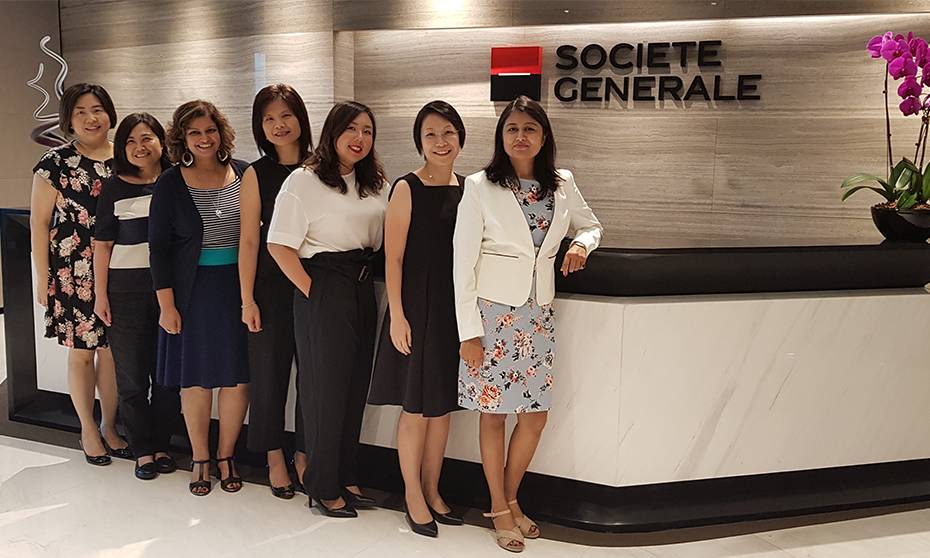
The firm's HR head in Southeast Asia shares the secret behind their high engagement figures in the region

Societe Generale believes that employees’ quality of life at work, together with their overall well-being, are key for maintaining efficiency, effectiveness and sustainable performance.
The bank has thus placed high emphasis on employee experience as a key factor contributing to its long-standing success.
According to Mukta Arya, Head of Human Resources, South East Asia and Head of Talent Development and Inclusion, Asia Pacific at Societe Generale, the bank regards its employees as its biggest asset and this is vital for achieving the group’s ambition.
“We know that if our employees are not motivated and energised, we will not be able to achieve our goals,” Mukta said.
This is why the bank set up Staff Engagement Committee (SEC) in 2013 in Singapore to sustain a high level of employee engagement.
The SEC has since evolved into sub-committees that cater to a variety of individual interests, including sports, recreational, and corporate social responsibility (CSR) which includes employee volunteering.
All of which are fully employee-led and endorsed by the CEO and COO. Both leaders are involved in discussions and meetings that support these initiatives.
Commitment to this strategy has improved the bank's employee engagement level for Singapore and Southeast Asia (SEA) significantly.
Notable points from the survey showed that almost nine in 10 employees cited ‘positive’ feelings about the work atmosphere. Motivation levels also showed improvement, with employees sharing positive feedback to HR and the management teams.
READ MORE: How engaged are employees in Singapore?
“These employee-driven activities are completely voluntary and typically oversubscribed,” Mukta said.
Mukta’s HR team handles responsibilities across the SEA region and over the past year, has been involved in the organisation’s global and regional business transformation.
The team has also been constantly looking at new and innovative ways of engaging employees through a mix of digital and human interactions. Their steady and stellar work have secured their place as one of Asia's Top HR Teams.
“As an HR team, we focus on our employees as individuals,” Mukta said. “We believe that if people do things that they believe in, the result will be different. The organisation provides a platform for varied activities and employees choose to participate in the ones that they feel connected to.”
HR’s role in employee engagement
Societe Generale understands that different people have different ways for stress relief, shared Mukta.
For example, some choose to focus on health or sports, while others prefer to engage in handicraft sessions. This is why the engagement team regularly seeks employee feedback to customise their initiatives.
“Mostly, it’s about listening to our people on the ground through career interviews or feedback that they provide to us on different forums or directly, not only to HR but also with their managers,” she said.
“We listen to them and say that, ‘okay, these are the [activities] we can do and which can be offered to employees’, and then they can pick and choose what they want to participate in.”
As for HR’s role in employee engagement, Mukta highlighted that HR must be a strong partner to the business and play a supportive, advisory role.
“HR is a facilitator — banking is a people business,” she said. “Our role is to advise…to highlight whether the initiatives are in line with our policies, our general values and accepted behaviour in the company.
“Mostly, HR is an advisor and a link between the employee and management. It’s not about taking sides, but actually looking at things objectively from both sides to ensure alignment.”
Sustaining employee engagement
While engagement has been positive thus far, how will Societe Generale sustain the high figures, especially with the changing nature of work?
“The essence of the strategy will remain the same because of the intention behind it,” she said.
“The mode of how we deliver employee engagement may differ — whether we use more digital modes of engaging people, like an app, and the way we track engagement — that may change. But the intention to keep people motivated and energised should remain the same.”
READ MORE: How can HR increase human touch in tech world?
To keep their initiatives relevant, Mukta stressed that it’s all about listening to employees to meet their changing needs.
She noted, “Leaders need to be very proactive in terms of understanding the needs of the people, either by talking to them personally or observing what’s happening outside of the organisation, and then adjusting their strategies accordingly.”
“The most important thing for HR is to have a genuine interest in people,” she said. “As leaders, we need to be in touch with the people.
“I have informal catch-ups with them over coffee, or just talk to my colleagues, to know what’s happening on the ground. Only then can we figure out what we can do to make them happy and engaged.
“If we don’t meet them often, don’t connect with them, I think we’ll never know what keeps them engaged. Because everybody’s different and people’s priorities often change over time.
“What I discussed with them six months ago may not be relevant anymore. So while it’s challenging to keep up with our employees’ ever changing needs, it’s certainly not impossible.”